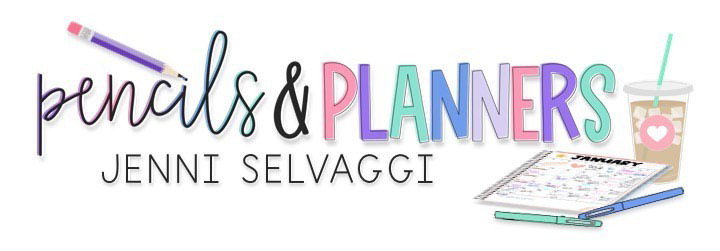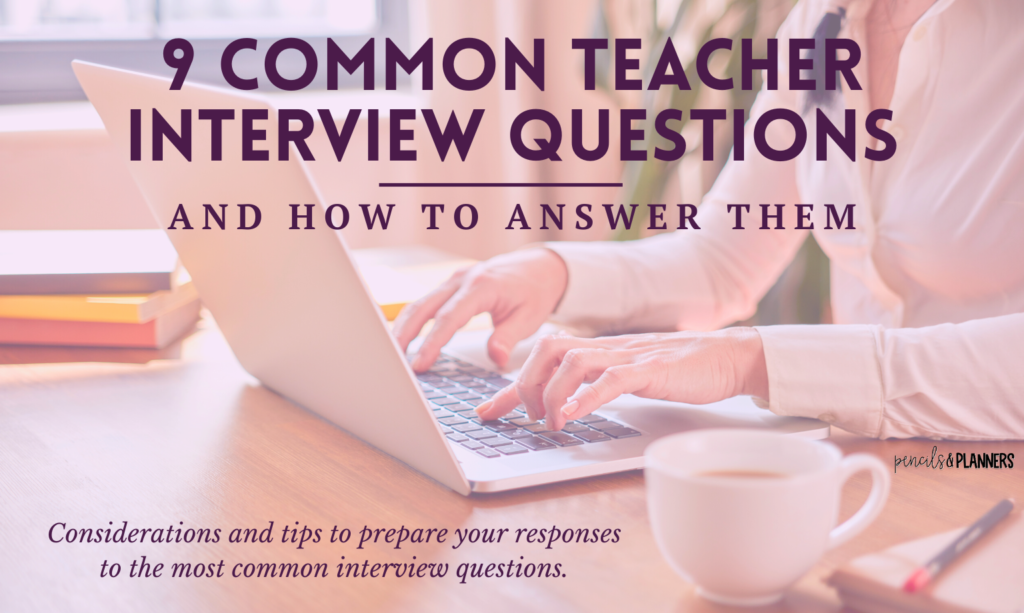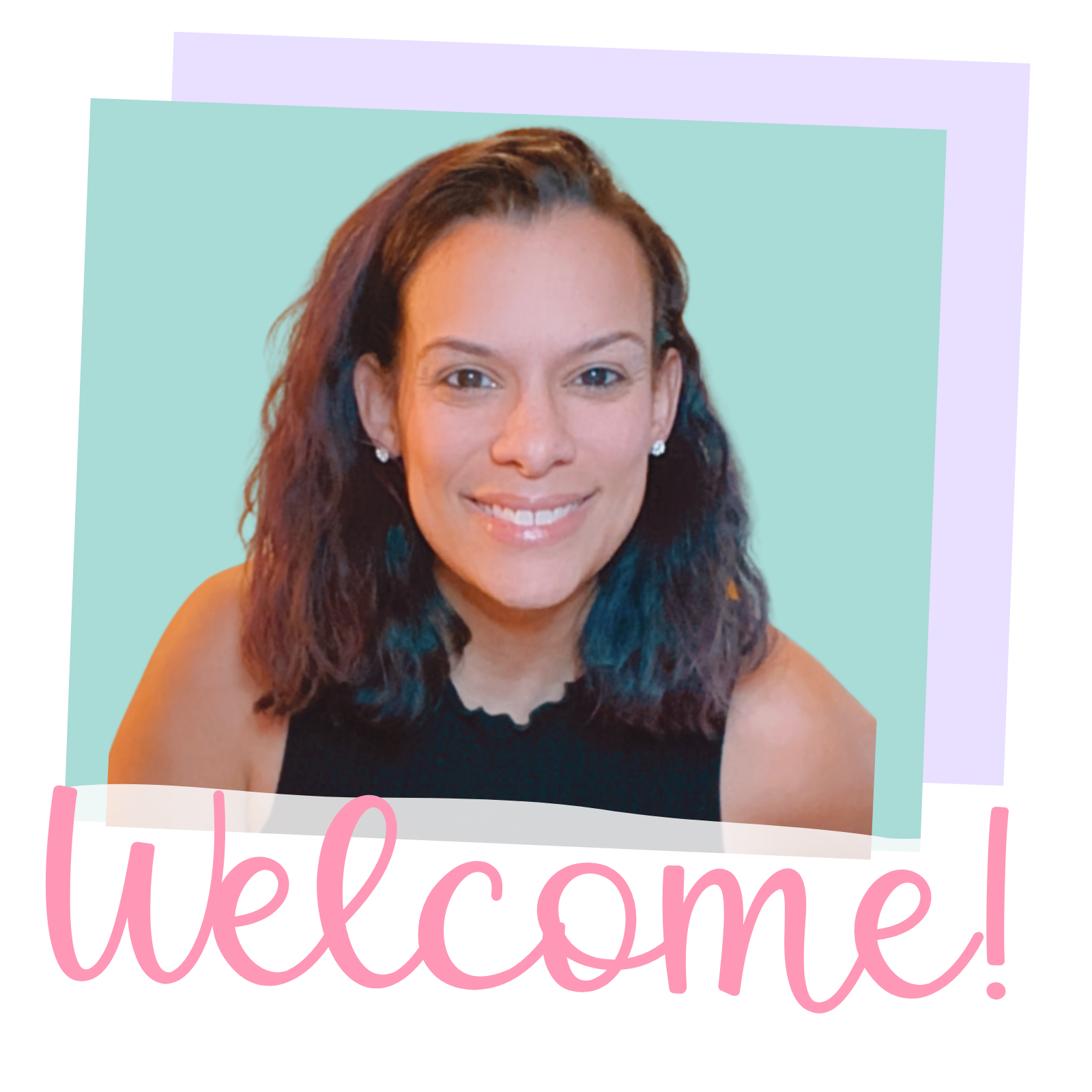Congratulations! If you’re here with me right now, you’ve either gotten a job interview or are preparing to find the job of your dreams. You might even be wondering, “What are the most common teacher interview questions?” In this blog post, we’re going to walk you through some of the questions interviewers will ask during your teacher interview.
If you’ve been following along, in our blog post, 5 Don’t-Skip Tasks to Ease Your Search for Teacher Jobs, you completed a handful of important tasks. Those tasks have already given you great talking points for questions related to why you want to work at the school and your knowledge of current educational issues and trends. Additionally, the information about the school and/or district will help you develop questions for YOU to ask at the end of the interview.
In this blog post, we’ll go over:
- Top 9 most common asked interview questions for teachers
- Tips on how to answer them
- Key points to consider in your answers
Before you get started, here are three reminders to hold with you when preparing and answering your interview questions:
- remember to keep the students your #1 focus; regardless of the question, think of the students in your response. But don’t worry, it’s not too hard – you *are* becoming a teacher! 😉
- Where possible, include ways to tie in district initiatives, programs, and goals to your answers.
- Try to include examples of what you’ve done or what you will do.
If you’re looking for a complete roadmap to research and prepare for a teaching job interview, download the Roadmap to Interview Success.
NOW, let’s chat interview questions. I’ve pulled 9 of the most common topics that interviewers will ask about. Under each topic, I’ve added what the school/district might be looking for when they ask this and key points to consider when answering.
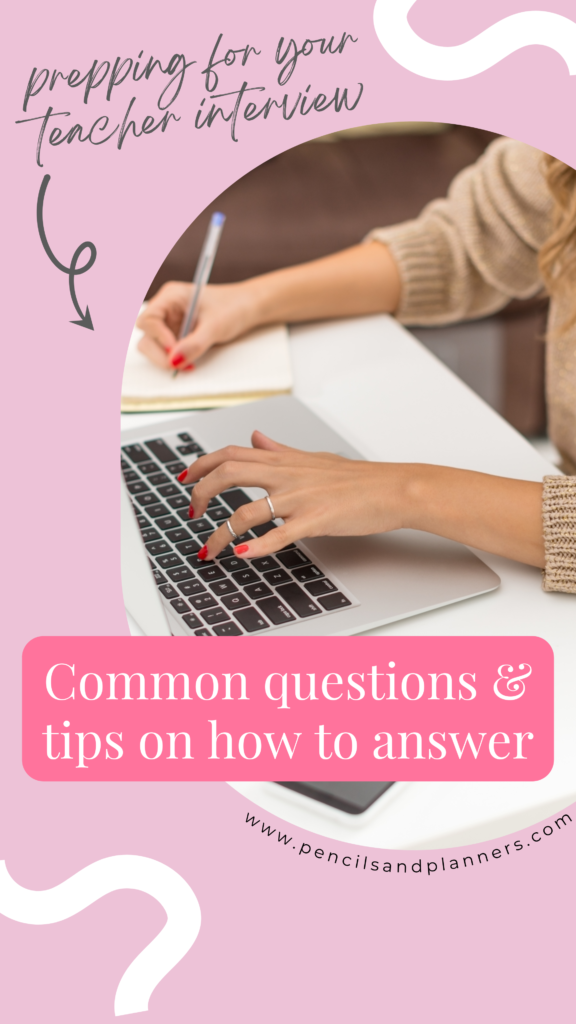
Interview Questions for Teachers
- Tell me about yourself. Interviewers use this most common teacher interview question to warm up into the interview. They want to get to know you, why you want/wanted to become a teacher, and what led you to apply to their district or school.
- Keep it short and sweet.
- Keep it relevant to education.
- Share a key pivotal experience that led you to want to teach (if applicable).
- Name one strength and one weakness. Interviewers are looking for your own self-awareness and how you leverage or grow through these qualities:
- PRO TIP: Always share your weakness and turn it into a positive!
- Are you a perfectionist? Great, you give 200% every time, you leave no stone unturned but you’ve been working on “done not perfect” and understand that you can pivot any time.
- Have a hard time saying no? You are a team player, you want to support and be involved in the school and in the community. You’re working on assessing your bandwidth before saying yes so that you can give 100% to everything you’re a part of instead of giving 10% to a hundred things.
- Struggle with change? Spontaneity can be fun, but you prefer to be prepared. As an educator, planning and preparation are essential, but you’ve also learned that being flexible is important when working in schools and with children.
- PRO TIP: Always share your weakness and turn it into a positive!

Questions About Teaching
- If I were to walk into your classroom during [literacy/math] block, what would I see? What would that look like? Interviewers are looking for your knowledge of a quality lesson, how you plan, and how you check for understanding.
- When you researched the school/ district you’re interviewing at, you may have been able to discover what curriculum they use for their core curriculum and familiarize yourself with its structure; that information will be helpful in answering.
- If you’re a recent student teacher, use what you’ve observed, what you’ve learned, and implemented during your practicum.
- If you’re a newer teacher, share what your typical block/lesson looks like and include reflections on what went well and what things you have worked on and/or continue to work on.
- How do you assess your students? How do you differentiate? Schools/districts want to ensure you understand the many ways students learn, how to use data from student learning to provide enrichment or remedial support, and how you assess understanding/progress.
- Include ways to check for understanding during and at the end of a lesson, various opportunities and methods you use in responding, and tools used (e.g., JamBoard)
- Share assessments – formal, informal reports, projects, rubrics, etc. + how you use or conduct these assessments.
- Mention any project-based learning or alternate ways to assess student understanding.
- What is your teaching philosophy?
- There’s a pretty good likelihood that you’ve written your teaching philosophy in one of your preservice courses.
- Include strategies and methods you’ve used or plan on using.
- How do you ensure you’re reaching all learners, especially our Special Education and English Language Learners?
- Explain if/how you’ve followed IEPs, 504s, etc.
- Tie in how you differentiate their work (both in lessons and in independent assignments).
- Tell us about how you incorporate SEL in your daily plans.
- When researching the district, be sure to look into whether they have a SEL curriculum they follow.
- Share how you’ll build skills and relationships inside and outside the classroom
- If possible, detail how you’ll add it to your daily lessons.

Interview Questions About Working with Others
- How do you deal with families? How do you communicate with families? In your career, you will deal with all types of parents. Schools want to hear about how you communicate with families, how you involve them in their child(ren)’s learning, and how you handle difficult conversations.
- Talk about how you encourage and support the home-school connection and sharing resources.
- Share how you have had or how you envision parents volunteering.
- Include how you maintain regular contact (e.g., weekly or monthly newsletter).
- Be sure to mention that your updates will be for both positive instances and concerns.
- How would you handle a challenging student? Interviewers want to know that you’ve got some strategies in your toolkit to support ALL students. In any situation, it’s important that you know your students; this will help mitigate many issues throughout the year.
- First, remember that difficult and challenging looks a LOT of different ways and will warrant different approaches.
- Consider what you would do (or what you’ve seen work) with students who are disengaged, seemingly defiant, or disruptive.
- The key is to find the root cause of these behaviors in order to respond effectively.
- Some key things to consider are working WITH the student to find solutions, leveraging the student’s strengths, what motivates the student, what resources can be used, and how building relationships can be instrumental in supporting a challenging student.
Prepping for these 9 question buckets will help you answer a good portion of the most common teacher interview questions. This is an opportunity for the school and district to see how you fit into their community – what you bring to the table and what they can do to support your growth as an educator.
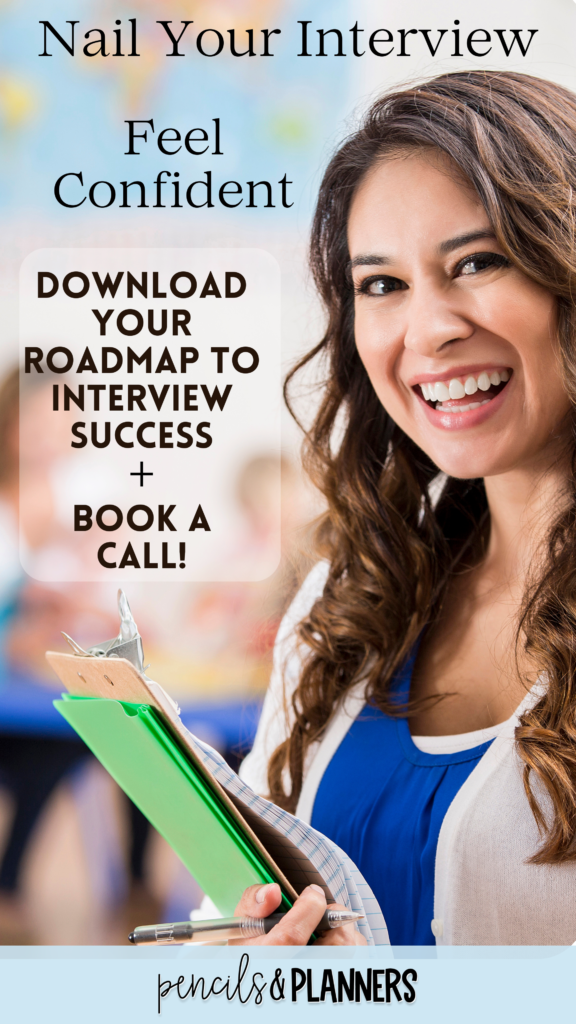
Here are your tasks for this week:
- Stop and draft some responses to the questions above. They DON’T have to be written in full sentences; make them bulleted lists that you can use to help you remember the key points you want to address when answering your questions.
- Click here to book a time to go over your responses. During our time together, we’ll make sure you’re answering the question and have an example or two to share, and we can go over any other questions you might have!
Additional reads you may be interested in:
- 5 Don’t-Skip Tasks to Ease Your Search for Teacher Jobs
- 30 Interview Questions Every Teacher Must Be Able to Answer (Plus 5 to Ask!)
- 25 Common Teacher Interview Questions and How to Answer Them
- Common Teacher Interview Questions and Preparation Tips
If you’re looking to chat through your answers or would like to set up a mock interview, click here to schedule a time.
Tell us in the Comments…
If you’ve been interviewed before, share with our future teachers one question you were asked in your interview in the comments.
If you’re about to jump into the interviewing process, what’s one question you’re not sure how to answer?
